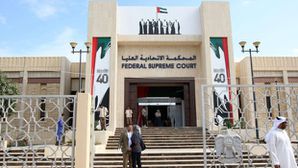 A state security court in
the United Arab Emirates on Sunday sentenced five activists who have campaigned for political freedoms in the oil-rich Gulf federation to prison terms of up to three years.
A state security court in
the United Arab Emirates on Sunday sentenced five activists who have campaigned for political freedoms in the oil-rich Gulf federation to prison terms of up to three years.
The UAE has faced an outcry from rights groups over the trials, which were held in the country’s highest court that normally tries terrorism suspects and has no recourse for appeal.
The UAE has not been hit by the Arab Spring unrest that has spread across much of the rest of the Middle East, including neighbouring Bahrain. But the activists’ trial appears to reflect Abu Dhabi’s strategy of snuffing out any sign of dissent that could pose a challenge to the tight political controls in country.
The three-judge panel sentenced one prominent blogger, Ahmed Mansour, to three years in prison. The others received two-year jail terms, including Nasser bin Gaith, an economist who has lectured at the Abu Dhabi branch of Paris’ Sorbonne university. Mr. Bin Gaith also served as a legal adviser to the UAE’s armed forces until April, when he was taken into custody from his Dubai home by federal security agents.
“I am disappointed,” said defence lawyer Mohammed al-Roken. “The fact there is no appeal is very worrying since it does not meet all standards of fair trial.”
The five were arrested in April after signing an online petition demanding political reforms, including a parliament selected by open elections. The charges included insulting the country’s top leadership and endangering national security.
Political activity is severely restricted in the UAE, an alliance of seven semiautonomous states, each ruled by a hereditary sheik. There are no official opposition groups in the country and political parties are banned.
In an unprecedented move for the politically quiescent country, 130 people in March signed a petition demanding constitutional and parliamentary changes, free elections and a more equitable distribution of the country’s oil wealth.
The five defendants have reportedly been on hunger strike for two weeks. They did not attend the sentencing Sunday. Since the trial began in June, the defendants only attended the first, closed-door hearing where they all pleaded not guilty. They’ve boycotted the proceedings since because the presiding judge had refused to consider their request to be released on bail.
After Sunday’s verdict, dozens of men gathered in front of the court in a state-organized rally.
“Justice has been served,” said Thabet al Qaisi, 29-year old businessman from Abu Dhabi. “I respect any decision of our nation’s court. Were they pronounced innocent, I’d be the first to welcome them outside. But they have been convicted and the punishment is fair.”
Only one relative of a defendant attended Sunday’s hearing. Khalifa al-Nuaimi, bin Gaith’s nephew, told reporters his family had hoped the court would “recognize his innocence” and order his release.
“This is a great shock to our family,” al-Nuaimi told reporters outside the court. “This is unexpected and a very harsh judgment.” Minutes later, al-Nuaimi was attacked by a government supporter, who punched him in the face amid a heavy police presence around the court.
The UAE marks its 40th anniversary of independence next week and some demonstrators suggested the activists could receive a presidential pardon. But the defendants have previously rejected the idea of a pardon unless it was accompanied by the entire case being thrown out.
Samer Muscati, a researcher for New York-based Human Rights Watch, called the proceedings “fundamentally unfair.”
“It is highly disturbing that after almost eight months in jail, these men get to spend more time locked up on these ridiculous charges,” he said.
The current federal parliament serves as an advisory body. Its 40 members are either directly appointed by the ruling sheiks or chosen by group citizens hand-picked according to tribal and regional ties by the rulers to vote.
The last such election – only the second since the country’s foundation – was held in September. The electoral pool was significantly expanded and while the 129,000 voters still represent a fraction of the nearly 2 million Emiratis, the decision was seen as a concession by the rulers, under pressure from demands for reforms around the region.
Source: http://www.theglobeandmail.com/news/world/africa-mideast/uae-court-sentences-five-political-activists/article2251097/

/image%2F0994931%2F20220514%2Fob_0ba45b_picture-interview2.jpg)